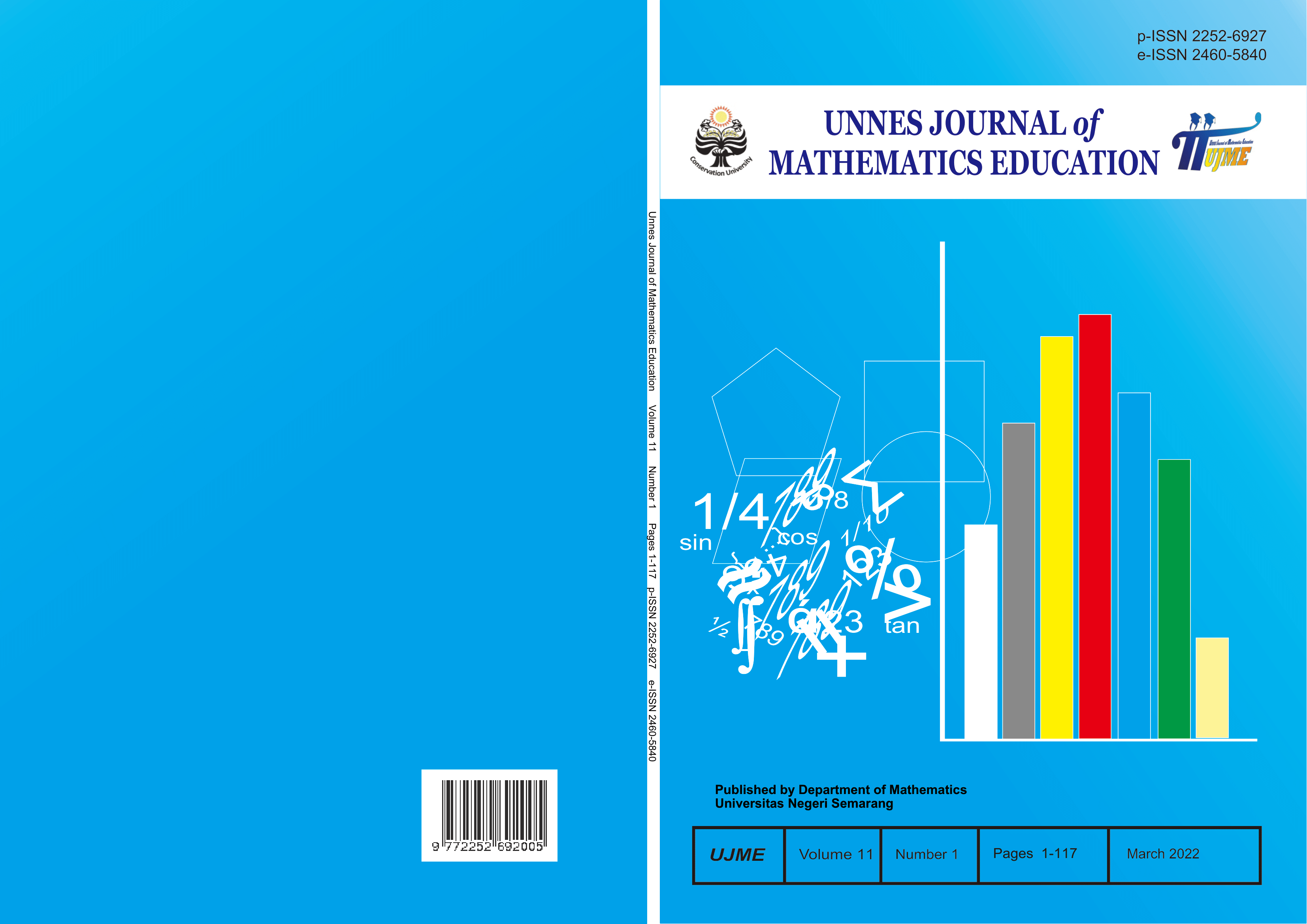Development of STEAM-based Teaching Materials on Trigonometric Equations to Improve Students’ Mathematical Creative Thinking Ability
##plugins.themes.academic_pro.article.main##
Abstract
This research was a development research that aims to develop and to know the quality of Science, Technology, Engineering, Art, and Mathematics (STEAM)-based teaching materials viewed by the suitability of characteristics, validity, readability, and improvement of students’ mathematical creativity thinking ability. This research used the stages of Research and Development (R&D) those are: (1) potential and problems; (2) data collection; (3) product design; (4) product test (readability test); (5) trial test; (6) final product. The result showed that the teaching material met the suitability of the characteristic. The result of the validity test showed a percentage of 89.3%. The readability test result showed a percentage of 74.8%. The analysis of the pretest and posttest showed that teaching materials could improve students’ mathematical creativity thinking ability with the N-Gain score of 0.34 in the medium category. Therefore, the Science, Technology, Engineering, Art, and Mathematics (STEAM)-based teaching materials is qualified.
##plugins.themes.academic_pro.article.details##
References
BNSP. (2017). Standar Buku Ajar dan Modul. Jakarta: Ristekdikti
Bush, S. B., et al. (2015). Artist? Mathematician? Developing Both Enhances Learning. National Council of Teacher of Mathematics: Teaching Childern Mathematics, 22(2), 61-63.
Daryanto, & Dwicahyono, A. (2014). Pengembangan Perangkat Pembelajaran (Silabus, RPP, PHB, Bahan Ajar). Yogyakarta: Gava Media.
Inawati. (2019). Tingkat Membaca Pemahaman Mahasiswa terhadap Isi Wacana dengan Tes Rumpang. Jurnal Bindo Sastra, 3(1): 23-28. ISSN: 2579-7379.
Khulsum, U., Hudiyono, Y., & Sulistyowati, E. D. (2018). Pengembangan Bahan Ajar Menulis Cerpen dengan Media Storyboard pada Siswa Kelas X SMA. DIGLOSIA, 1(1): 1-12. E-ISSN: 2615-8655.
Nazilah, N., Laila, K., Irsad, R., dan Ana, Y. R. W. (2018). Pengembangan Bahan Ajar Berbasis Socio-Scientific Issues pada Materi Pemanasan Global. Science Education National Conference. 31 November 2018.
Nufus, Z. (2021). Analisis Kemampuan Berpikir Kreatif Matematika Siswa MTsN. Skripsi Pendidikan Matematika Universitas Islam Negeri Ar-Raniry.
Patmalasari, D., Afifah, D. S. N., & Resbiantoro, G. (2017). Karakteristik Tingkat Kreativitas Siswa yang Memiliki Disposisi Matematis Tinggi dalam Menyelesaikan Soal Matematika. Jurnal Ilmiah Pendidikan Matematika, 6(1):30-38. ISSN: 2502-1745.
Qadri, L., Ikhsan, M., & Yusrizal. (2019). Mathematical Creative Thinking Ability for Students Through REACT Strategies. International Journal for Educational and Vocational Studies, 1(1), 58-61. doi: 10.29103/ijevs.v1i1.1483
Roh, K. H. (2003). Problem-based Learning in Mathematics. Educational Resources Information Center.
Runisah, Hermawan, Tatang., & Dahlan, Jarnawi Afgani. (2016). The Enhancement of Students’ Creative Thinking Skills in Mathematics through The 5E Learning Cycle with Metacognitive Technique. International Journal of Education and Research, 4(7): 347-360. ISSN: 2411-5681.
Sudijono, A. (2016). Pengantar Statistik Pendidikan. Jakarta: Grafindo Persada.
Sugiyono. (2018). Metode Penelitian Kuantitatif, Kualitatif, dan R&D. Bandung: Alfabeta
Sundayana, R. (2015). Statistika Penelitian Pendidikan. Bandung: Alfabeta.
Susanti, E. (2016). Glosarium Kosakata Bahasa Indonesia dalam Ragam Media Sosial. DIALEKTIKA: jurnal bahasa, sastra, dan pendidikan bahasa dan sastra Indonesia, 3(2), 299-350. E-ISSN: 2502-5201.
The Global Creativity Index. (2015). The Global Creativity Index 2015.
Wahyudi, et al. (2018). Mathematical Creative Thinking Ability and Scaffolding Process According with Learning Styles for Pre-service Teachers. Anatolian Journal of Education, 3(1), 39-50. E-ISSN: 2547-9652.
Yakman, G. (2008). STEAM EDUCATION an overview of creating a model of integrative education. Foreign Affairs, 91(5), 28.
